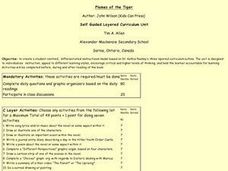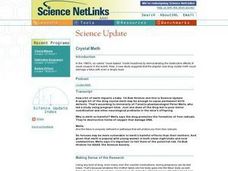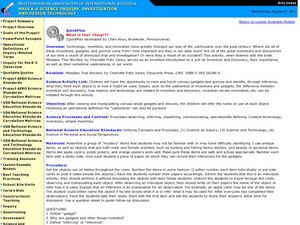University of Pennsylvania
Using Comic Strips to Teach Multiple Perspectives
Scholars view comics from two different perspectives; one paints the Alfred Dreyfus as innocent, while the other portrays the exact opposite. They solve the mystery of what happened by analyzing the source, working in groups, and...
Newseum
Slanted Facts and Slippery Numbers
The Internet is known as the information superhighway, but sometimes it's hard to know when to hit the brakes on unreliable sources. Using a well-rounded lesson plan, pupils read and summarize articles about the gender pay gap and...
Curated OER
Writing Reports
Students critically examine the features of reports aimed at a young audience. Students discuss characteristics of a good report (who, what, where, when, why, how). They write their own report and include these characteristics in their...
Curated OER
First Black US Congresswoman Dies
In this English worksheet, learners discuss Shirley Chisholm. Students debate and discuss American politics, focusing on Shirley Chisholm. Learners discuss the differences compared to their own country of origin.
Sharp School
World History Timeline Project
Using and online tool called TimeRime, class members create timelines that include what they consider to be the top 10 most important events from the first semester of world history. The first few pages of the assignment focus on how to...
Curated OER
Study of an Underwater Voyage
Students examine the experiment of Lloyd Godson who lived 13 days underwater. In this critical thinking lesson, students predict, study and discuss various aspects of the underwater voyage. The lesson includes many cross-curricular...
Curated OER
Objective Versus Subjective
Students examine the difference between subjective and objective statements, newscasts, and media. They discover that subjective is opinion based and objective is fact based.
Curated OER
Basic Calculus: Extrema, and Optimization: Putting it all Together
In this extrema and optimization worksheet, students identify all points in the domain and determine the critical points. They compute the second derivative and find the global maxima and minima. This two-page worksheet contains two...
Curated OER
Becoming familiar with National Public Radio
Students listen to a National Public Radio program. They summarize the program, and write a script from a controversial newspaper article that could be a part of the NPR program they listened to.
Curated OER
Stereotypes: More Than Meets the Eye
Young scholars explore the concept of stereotyping. They observe images and media that portray the Middle East and its inhabitants. Students make determinations about the impact of the images on their perceptions. They consider ways...
Curated OER
Divorce And Stepfamilies: Breaking Apart, Coming Together
Students view a PBS "In the Mix" video about the challenges teens face when their parents divorce and/or remarry. They participate in a class discussion about the video, role-play related situations and explore media depictions of...
Curated OER
Primary Concerns
Students articulate their understanding of the primary process, critically evaluate the primary process on a systemic level and explore the significance of the Super Tuesday primaries on a Presidential election.
Curated OER
Growing a Citizen
Students analyze messages and values associated with civic engagement present in the media. They analyze the local community's promotion of values associated with civic engagement by conducting investigative research. They hypothesize...
Curated OER
Flames of the Tiger
Young scholars use the differentiated instructional model based on Dr. Kathie Nunley's three layered curriculum outline. The unit is designed to individualize instruction, appeal to different learning styles, encourage critical and...
Curated OER
Bench-Pressing Issues
Students examine some of the issues that may be facing the changing United States Supreme Court. With further exploration, they formulate their own opinions and deepen their awareness of these critical topics.
Curated OER
In the Shadow of My Country: A Japanese American Artist Remembers
Students analyze artist's themes and means of communication, think critically about their sources of information, and weigh claims of national security against the civil liberties of diverse groups.
Curated OER
Cloning
Students view the history to cloning cats. Students show examples of what they know about cloning. Students surf the net on all theories on cloning. Students view the critics views on cloning.
Curated OER
Crystal Meth
Young scholars read and discuss an article on the devastating effects of crystal meth on a fetus development in mice. They relate this research to the possible causes of birth defects in babies whose mothers have used meth during...
Curated OER
What Is That Thing?
Could your class identify an old-fashioned can opener? What about a rotary phone,...
Curated OER
Should Kids Vote?
High schoolers develop critical analysis skills important to evaluate democratic structures. They increase their knowledge of the characteristics of voters and voting impact on the Electoral System.
Curated OER
The Ethics of Embedded Journalists
Students reflect upon the role of embedded journalists in today's media climate. They write about why would journalists not want to consider themselves part of the "group" that makes up the military unit they are assigned to. Also,...
Curated OER
The Other Drug War
Learners develop critical thinking skills as they construct arguments for one of the three debates described in the lesson on "The Other Drug War."
Curated OER
Discrimination Hurts
Fifth graders interpret stereotyping and discrimination as limiting and hurtful behaviors and demonstrate how to address these behaviors in a positive manner. In this discrimination lesson plan, 5th graders use the poem The Woman Who...
PBS
The March on Washington and Its Impact
High schoolers read Martin Luther King, Jr's speech that he gave in Washington. They identify the social conditions that led to the civil rights movement. They discuss the significance of the March on Washington.

























